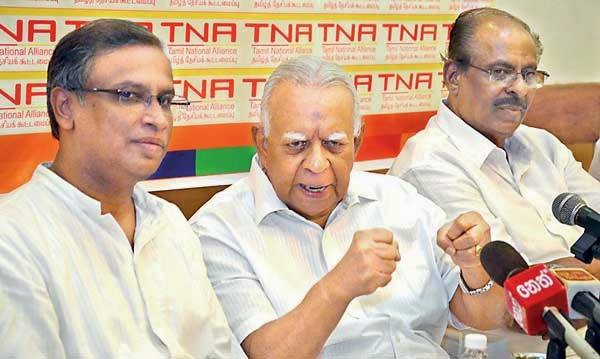Track Record Of TNA – A Sad Saga

the three musketeers of the TNA

“But I don’t have a very good track record with royalty. My dress fell off in front of Prince Charles at the Prince’s Trust, so I’m just living up to my reputation.” – Kate Bush, British Singer
The UNP has suffered severe losses at the Local Authority Elections. The Tamil National Alliance (TNA) has likewise sustained significant setbacks, not only electorally, but politically as well. The losses of the TNA (read, ITAK, the prima donna, calling all the shots in the Alliance) are not sporadic; but seem pervasive across the entire electoral landscape of the Tamil heartland in the North-East.Compromising on core ideals whilst cohabiting with the Sirisena-Ranil government has cost the TNA/ITAK dearly.
Breach of Trust
At the dawn of New Year, TNA leader Mr. Sampanthan had found it propitious to bluff his way through an interview with the Indian daily, Hindu. (The Hindu, 03 Jan.2018 – “We can’t despair, we can’t abandon things ,says Sri Lanka’s R. Sampanthan”). Sampanthan had. Inter alia, asserted that the TNA “made the correct decision in backing Mr. Siriena” at the Presidential Election in 2015. Nobody in the Tamil community had ever questioned TNA decision on that count. Our complaint is not about backing Sirisena at the Presidential Election; but about backtracking on the post-Election promises. compromising on the fundamental tenets of the ITAK and, in sum, about the breach and betrayal of the Tamil people’s trust.
The Three Musketeers
TNA leadership cannot keep their eyes closed and assume that everything is hunky dory about the Tamil issue. The electoral losses should have brought them to their senses. If, on the contrary, the ill-fortune has not dampened their sanguine enthusiasm in contumaciously consorting with sleazy Southern partners, it lies in the logic of history that the TNA/ITAK may slowly sink into oblivion. To some of us, it will be a very painful prospect. Mr.Ranil Wickremesinghe had since admitted his missteps and accepted responsibility for the UNP debacle. Where are the three musketeers of the TNA – Sampanthan, Sumanthiran and Senathirajah – whose post-war polemic and gimmicks have led the Tamil people down the slippery slope ?. Their silence on the electoral losses is deafening.
Corrective Steps Needed
Mr. Sampanthan had, in parliament, made a post-election statement, targeting the ethnic majority audience and his speech merits a round of applause. In regard to the Tamils the trio, collectively or individually, ought to admit “nostra culpa”/ “mea culpa”. Further, the revisionist leadership should take concrete corrective steps to mend their wayward escapades and regain their ideological roots.
“Those who cannot remember the past are condemned to repeat it” (George Santayana?) This pithy aphorism serves to explain the rationale for TNA/ITAK’s electoral reverses. Ever since it was founded in Dec. 1949, the ITAK (a.k.a, as Federal Party) had incrementally eroded the voter base of the ACTC (All Ceylon Tamil Congress) led by Mr.G.G. Ponnambalam, accusing the latter as an appendage/proxy of UNP. Thus, ITAK had, eventually, dislodged the ACTC from its primacy and emerged as the dominant voice of the Tamils. ITAK had nurtured and nourished its image as an uncompromising, radical anti-Establishment entity, passionately committed to the Tamil nationalist cause.
“Hath Havula” National Government
Following the March 1965 General Elections, both the ITAK and the ACTC became constituents of the “Hath Havula” coalition government, ostensibly designated as “National government”, under Mr. Dudley Senanayake (whose UNP won only 66 seats and the SLFP 41 seats in the 151-seats Assembly). Since the ITAK mores enjoined the elected M.P.s not to accept ministerial positions, Mr. M. Tiruchelvam Q.C. of the ITAK was appointed a Senator and sworn in as Minister of Local Government.
Joint opposition played ‘communal card’
(A digression may be warranted) In an attempt to oust the government, the Joint opposition (SLFP-LSSP-CP) played the incendiary ‘communal card’ accusing the UNP of entering into a secret pact with ITAK leader S.J.V. Chelvanayakam. Their campaign theme was that Dudley had agreed to a Tamil Federal state and thus had paved the way for separatism. The crass campaign slogan was, “Dudleyge Bade Masala Vade”. The UNP-ITAK relationship ruptured soon and, in Nov.1968, Minister Tiruchelvam was obliged to resign. However, until 1970, ITAK continued to extend critical support to the government. Typically, the style and substance of Rajapakses’ post-2015 manoeuvres to regain their lost kingdom – and their ultra-nationalist slogans to seduce the Sinhala-Buddhist constituency – tend to recall the 1965-70 scenario and the stratagem of the SLFP-led United Front to oust Dudley government.
ITAK paid heavy penalty
The ITAK paid a heavy penalty for cohabiting with the UNP. At the May 1970 Parliamentary Elections ITAK heavyweights, Dr.E.M.V. Naganathan (Nallur) Amirthalingam (Vaddukoddai), S.M. Rasamanickam (Paddiruppu) suffered defeat at the hands of nondescripts. Even in some electorates where the ITAK managed to win, they scraped through by a measly majority – Jafffna (by 56 votes), Mannar (69), Point Pedro (315).

